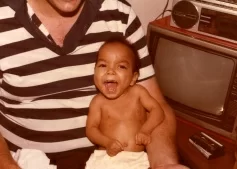 without a thought on my part. But Luke came to my mind yesterday and I looked up some information on him and discovered that his birthday had just passed. I found this old article that I wrote about Luke a few years ago. I thought I'd share it again. I am convinced that there are important and significant lessons we can learn from his life, and that I need to regularly share what I think they are. I hope you enjoy this!
without a thought on my part. But Luke came to my mind yesterday and I looked up some information on him and discovered that his birthday had just passed. I found this old article that I wrote about Luke a few years ago. I thought I'd share it again. I am convinced that there are important and significant lessons we can learn from his life, and that I need to regularly share what I think they are. I hope you enjoy this!The mysteries of God are a part of the Christian life that can often lead to confusion, doubt and even discouragement for believers.
- For some, it's a pride thing. We want to have answers – we want to understand, to be able to grasp the complexities of Biblical truth and God's plan for mankind.
- For some, God's mysteries – the unexplained things of life – are stumbling blocks to faith:
1. Why do bad things happen to good people?
2. Why does He allow pain, suffering and evil to thrive in our world?
Several months ago we were witnesses to the aftermath of the tragedy in Pennsylvania involving the Amish community, where, good, decent, hard working, non violent people were subjected to unspeakable cruelty towards their children. How can this happen?
3. One of our CSC children, who grew up in the worst poverty imaginable in Cebu City, was adopted into a family in the United States several years ago. Well meaning people would tell her how lucky she was and how God obviously had a wonderful plan for her life. She had a hard time with that and would sometimes ask her parents, "But what about all the kids who are still there, who weren't adopted, and who are still suffering and dying? What is God's wonderful plan for their lives? Why me and not them?
For many of us, we celebrate the goodness of God in our lives, we praise him for his healing, for material comforts, for blessing our efforts – even as we observe people who remain sick or disabled, who suffer in poverty – those who efforts and initiatives end in disappointment and ruin.
There are two extremes in terms of people's reactions to the things about God and life that are not understood.
1. There are those who try in vain to grasp the ungraspable – to be able to reduce the mysteries to understandable formulas or explanations. I remember a young seminarian who came to Cebu and who filled the pulpit of our church on a Sunday evening. He preached for an hour on the "peace of God that passes all understanding." Perhaps he felt that if he preached long enough he could crack that nut and open our understanding!
We all know those who have reduced the book of Revelation to precise charts and timetables, giving us easy to understand categories for all of human history and, most especially, the times to come.
2. A second category are those who shake their heads and say, "We'll only know these answers when we get to heaven." They suspend inquiry, not bothering to seek answers to the perplexing questions of life.
Living and working in a Third World country like the Philippines brings some of these mysteries to the front of our lives. Poverty, and all that goes with it, is "in your face." People often ask me "How do you like living in the Philippines?" That's a tough one to answer. Life anywhere has its highs and lows. Some days are great, others are difficult. I often answer this way:
1. When I'm sitting down to a nice breakfast I am aware that, within a few meters of my house are families that have no breakfast.
2. When I'm driving to the office or the Shelter I often pass people walking along the road who, for lack of a few cents can not even afford public transportation and must walk.
3. When I stop to buy medicine for my family or the CSC kids, there are people standing nearby whose children are dying for lack of that very same medicine.
Why am I blessed and they are not?
I recall a conversation with a missionary a few days after Cebu was hit by a strong typhoon. Many of our CSC workers lost their roofs or their entire homes. The houses of the poor were devastated by the high winds and torrential rains. The missionary said that it had been such a miracle how God spared the missionary homes from damage, holding his hands of protection around us during the storm. I remember wondering whether it wasn't more a matter of our having cement houses and strong metal roofs.
Why did our CSC kids have to suffer so much? And how much more, those who live on the street and cannot be admitted to CSC?
These are tough questions. When it comes to trying to understand our own suffering, the Bible gives some answers. For example, Romans 5:3-4 tells us that suffering produces perseverance, perseverance character, and character, hope. And the Bible gives us additional hope that we will someday come to see God's purpose and mysteries:
"But now we see through a glass dimly, but then face to face."
And we hear the testimonies of Christian brothers and sisters who have lived through terrible times and have turned negatives into positives in their lives.
Several months ago I was attending a conference in Bismark, North Dakota. One of the featured speakers was Steve Saint, Steve's father, Nate Saint, was one of the five missionaries killed in 1956 by Aucan warriors in Equador. Steve told about what that tragic day meant to his family, and what it was like when his dad, his hero, didn't come home that day. We saw video of his current family life, and saw a man who was interacting with Steve's children, and who was being referred to as "Uncle." It turns out that this was the very man who had killed Steve's father, who had come to know Jesus and had experienced the forgiveness of God and of the Saint family and now was a part of their family – an amazing story of how good things had come out of tragedy and suffering.
So the clear message is that God has a plan for our lives, we will discover that plan in the right time. He is writing our life's stories, but some of the chapters are difficult ones.
We can understand this. We can, when aided by the Holy Spirit, see how difficulties and suffering are part of a purification process for us, and that we, like Job, will eventually be better people for it.
But what about people who, because of major disabilities, are unable to understand their situation, unable to discern the hand of God or his plan for their lives. Where is the purification and growth and ultimate value for these people? What could God's purpose possibly be?
Back on 1982 a baby was born in a charity ward in a small hospital in Cebu City. 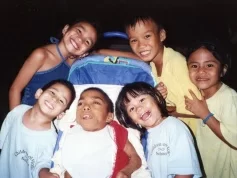 The baby underwent cardiac arrest during birth and was without oxygen for an extended time. Unlike many cases of charity patients, the hospital staff decided to resuscitate the baby, even after he had suffered massive brain damage and cerebral palsy. The baby's mother abandoned him in the hospital, and after a couple months Luke was referred to CSC. When we took him in he appeared to be a bouncing baby boy. We did not know that he would not develop physically beyond about a year and a half, or mentally beyond a few months. Luke would never speak, nor have voluntary movement of his arms or legs.
The baby underwent cardiac arrest during birth and was without oxygen for an extended time. Unlike many cases of charity patients, the hospital staff decided to resuscitate the baby, even after he had suffered massive brain damage and cerebral palsy. The baby's mother abandoned him in the hospital, and after a couple months Luke was referred to CSC. When we took him in he appeared to be a bouncing baby boy. We did not know that he would not develop physically beyond about a year and a half, or mentally beyond a few months. Luke would never speak, nor have voluntary movement of his arms or legs.
Luke became a fixture at CSC. For over 23 years he was an integral part of our lives and a symbol of CSC and what we are all about.
Many times Luke would be hospitalized – often due to upper respiratory infections. He fought for his life many times. There were at least a dozen times when we were sure that he would die. The doctors had told us that he wouldn't make it past five years old. Then they revised it to nine, then 11 – certainly he wouldn't reach his teenage years.
One time, when Luke was critically ill our staff met to pray and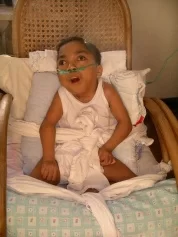 I asked them to reflect on his life. Here is why: I believe that God had a purpose for Luke's life when he created him. I believe that He uses people like Luke to teach us important things. But here is the rub: If we don't spend time reflecting on these lessons, then Luke's life is useless. Its up to us to allow God to make sense of Luke's life.
I asked them to reflect on his life. Here is why: I believe that God had a purpose for Luke's life when he created him. I believe that He uses people like Luke to teach us important things. But here is the rub: If we don't spend time reflecting on these lessons, then Luke's life is useless. Its up to us to allow God to make sense of Luke's life.
And what are the lessons that we found? What has God taught us through his life?
1. First, life is precious. Even though he had nothing to live for, from the world's point of view, Luke clung to live almost ferociously. Some of us who have much more to live for take life casually, we take life for granted. Not Luke. Every day was a struggle. Every breath had to be fought for. Life is a gift from God and we should treat it carefully.
2. God has provided us with opportunities, through Luke's life, to minister to him in significant and life-saving ways. He has provided an avenue for us to live out the biblical mandate to minister unto the "least of these," because, truly, Luke was in that category. Hundreds of people have been given a blessing to participate in the support of CSC that reaches out to children like Luke and many others with other special needs.
3. In so doing, He has given us a chance to show others a Godly value system that doesn't reserve love and attention for those who have something to give back, or who have "potential" or a bright future. For many people who live in a developing country, where resources are limited, this has been a difficult lesson to learn. How could we justify spending so much money for Luke's hospitalization when other, "normal" kids needed care? Luke's life gave us the opportunity to teach about the value of life and about how God looks at all of us.
4. Luke has been a tremendous ambassador for CSC. People around the world remember observing the loving care that he received by our staff and workers. They remember his famous smiles. They may quickly forget the names of the staff or other children, but they remember Luke. "How's Luke doing?" we get asked wherever we go to talk about the ministry of CSC. And our care of Luke helps us explain the true nature and core values of our work in the Philippines.
5. Luke has been a safety valve for those that had an opportunity to know him. My job as Field Director of CSC involves lots of administrative chores, like making budgets, government relations and various kinds of problem solving. There are days when I get stressed out and start to feel the weight of the world on my shoulders. But all I needed to do is to drive a few short miles to where Luke lived, to hold him in my arms, and I get a clear picture of what real struggles are all about. My struggles paled in comparison to what Luke faced every day. Self pity may be easy for some people, but those that knew Luke have no excuse for feeling sorry for themselves. What a great gift that was to all of us.
A little over a week before we left Cebu, Marlys called me on my cell phone and told me that I should get to the hospital quickly, as Luke wasn't doing well. He had been hospitalized for over a week and his breathing was bad. I had gotten messages similar to this one throughout Luke's life, so I went to the office and took care of a few things. But the Lord laid it on my heart to go see Luke and when I entered his room his breathing was extremely labored. He looked different than I had ever seen him, and it became clear that he was dying. I sat down next to him, kissed him and looked into his eyes. For 23 years we had loved this boy. It wasn't easy to say goodbye. I said to him, "Luke. You can go. Go to be with Jesus, Luke. I love you." Within a couple of minutes Luke took his last breath. 23 years of pain, suffering, limitations, hospitalizations, forced breathing, skin rashes and infections were over. We would never see Luke's smile again.
As Luke was dying in that hospital room, I made a promise. I'm not sure if I was making a promise to Luke, to God or to myself. But I decided then and there that I was going to talk about Luke on our coming furlough. I believed then and do now, that the church of Jesus Christ needs to hear about Luke, that the lessons of his life are important ones. Many Americans are complainers - full of self pity. People who have so many material comforts are unsatisfied. American discourse is increasingly a chorus of victim and entitlement claims. Charles Sykes, in his book "A Nation of Victims: The Decay of the American Character" states that, "in a nation where everyone is a victim, no one is a victim." In our preoccupation with our own needs we have a hard time seeing the needs of others – people like Luke.
In his song "God Help the Outcasts," the Hunchback of Notre Dame poses several difficult issues:
I don't know if there's a reason
Why some are blessed, some not
Why the few You seem to favor
They fear us, flee us,
Try not to see us.
The first part we have already examined. The second is our call to arms. "Why the few You seem to favor, they fear us, flee us, try not to see us."
I don't know what factors might make it difficult for us to see the needs of society's outcasts. Perhaps we are too busy. Maybe our personal and church calendars are so full that there just isn't room for Luke, or the man who had fallen to thieves at the side of the road, to break into our day. Maybe we are numbed or fatigued by the needs of others, or simply overwhelmed by the circumstances of our own lives. Maybe we have become cynical. "Why did that guy travel this road at this time carrying that amount of money? He deserves what he got!"
Maybe, just maybe, Luke can help cut through the apathy, the self-centeredness and cynicism of our lives. He was a person with significant needs that he didn't cause. He was totally dependent on others to live. His life had none of the possibilities and opportunities that we take for granted every day. He needed us so very much. Maybe Luke can serve as a symbol of many others that we come into contact with. Maybe Luke can help us rescue our lives.
The Best Phrase Ever Uttered
Thursday, June 27, 2017. First day of the 2017-2018 school year. The journey of all the students is about to begin. Students and teachers are all excited. It has been two months since the summer vacation started and now it has come to an end. Students have grown and become more mature.
On this promising day, I witnessed God’s love and how He touches each person’s life. It was the last period of the afternoon classes. Science was the subject which is everybody’s favorite. I was nervous yet excited knowing that they were the toughest class last year. There were a lot of “what ifs” running through my mind. To my surprise, as I stepped in the classroom everyone was sitting nicely, smiles on their faces, and they welcomed me with enthusiasm.
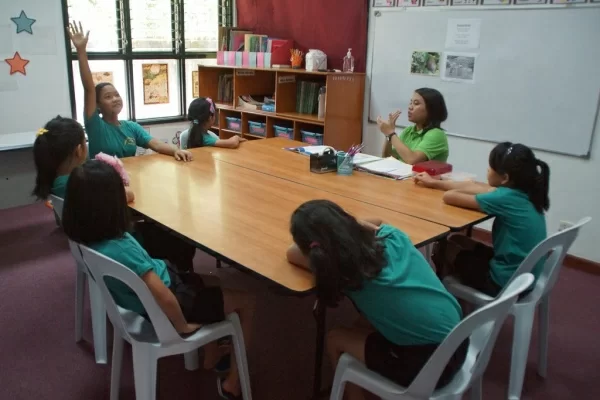
Student 1: Wow! Teacher Lyrah!
Student 2: Are you our science teacher, Teacher Lyrah?
I answered them back: Yes, I’ll be your science teacher for this school year.
Everybody started clapping and kept on saying, “Yes! Teacher Lyrah!”
I couldn’t hide the happiness inside of me when I heard those words coming from the students. They showed so much excitement as I began teaching the lesson and they were even engaged as we discussed the rules.
These students are more than just a blessing because they fill the empty space in my heart with this phrase, “Thank you!” Such a polite expression coming from them. Each time I distributed their notebooks, pencils, erasers, and their science books they never failed to utter the phrase, “Thank you teacher!”
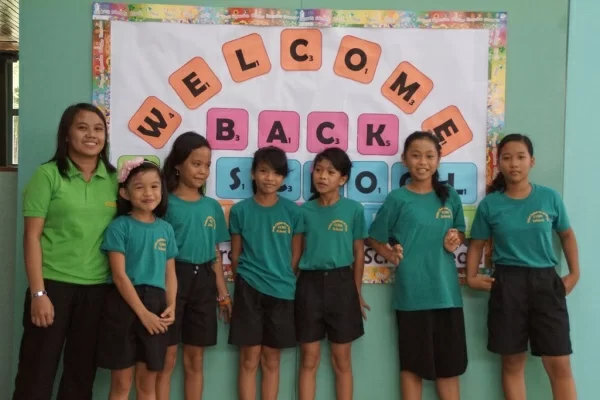
They made my day extra special! I am excited to continue to teach them throughout this school year and help mold them to be better individuals in the future!
Mini-Version
Most people get a "watered-down" version of Cebu when they come as tourists. Some only see what the tour guides want them to see. Some fly into the airport on the neighboring island of Mactan, but never cross the bridge that connects it with Cebu City. They experience the five star ambiance of the lush resorts and rub shoulders with wealthy people and well-trained staff who pamper them, but they never observe the realities of life in this Third World city. They are sanitized from the poverty, the pollution and the suffering of people in our city.
Visitors to CSC also get an abbreviated version of the story of the ministry. Although we show them our facilities and let them meet our staff and, when appropriate, some of the kids, we aren't able to give them the bigger picture. They see our wonderful homes and get a sense for the quality of care that our children receive. They visit our school and learn about the education that we provide. And they often have questions answered about where our children come and how they can help us.
But there is so much that goes on behind the scenes at CSC that is not apparent to visitors, even if they stay for more than a few days. They probably don't see the efforts of the social workers, child development team, teachers, nurses, therapists and other personnel who make it possible for us to bring children in and provide them with the comprehensive care that they require. Efforts like these:
- Social workers out in the field, working with birth families and gathering information needed for procuring birth documentation, or processing referrals;
- Meetings, meetings, meetings. There are at least ten meetings every day, both formal and informal, involving child care workers, house parents, counselors, therapists, office staff, social work and child development teams, school faculty and security and maintenance workers. These meetings involve financial planning, behavioral issues and updates, strategizing difficult case management issues, and sitting down with people from other agencies, both private and governmental, to advocate for our children;
- Nurses bringing children to labs, doctors' offices and clinics for medical assessment and care;
- Counselors meeting with children to discuss issues from their past or difficulties they may be having at CSC;
- Workers meeting with house parents to discuss problems in the home;
- Team-building activities, staff development and training that aims at making CSC a better place for the children who live here.
- Office staff handling the payroll, purchasing, banking, bill paying and other financial management tasks that are essential to keep things running smoothly;
- The work of transporting these workers to accomplish these tasks, and to get children to school or to doctors or dentist appointments. Our fleet of 10 vehicles is constantly being used to support the many activities and appointments that are needed.
- And, while they may get a sense for the financial needs of a program like ours in Cebu, they don't see the constant fundraising and promotional efforts going on in Minnesota through our stateside office. They don't know of the decisions being made by families and individuals to give generously and sacrificially to CSC for the care of the children, the same ones that they are observing on our playground, at the supper table or marching off to school.
We are thankful for each person who makes a contribution to the ministry here in Cebu, back in MN and around the world. People like you. I wish you could each be recognized by those who lead the tours here at CSC, because you help make the good things that they see possible.
Prepared Just For You
There are few things more rewarding than carefully preparing something for someone special to you and then showing it to them. That happened this past Tuesday in Banawa, the site of CSC.
At 8am a long line of little bodies walked up the dirt road from the shelter to their school and every face was filled with anticipation. The dedicated staff of the Cebu Children of Hope School had carefully worked and planned for two weeks in preparation for the start of the school year. Our first day began with an assembly where the students were introduced to their new teachers. The excitement from the children could have been from each one getting a new pair of shoes last week, it could have come from having extra CSC staff present to see the first day of school, it could have come from the immaculately clean building they were entering. I think it was something else. I think it was because each child knew that someone who cared about them had spent time preparing something special for them.
At the Cebu Children of Hope School children know that every teacher cares about them and is willing to do what it takes for them to experience success. I am honored and excited to lead this dedicated group of teachers who daily love on these beautiful children. It is going to be an amazing year!
Grace
God's grace shows itself to me in many ways. Some are glorious and some are not. 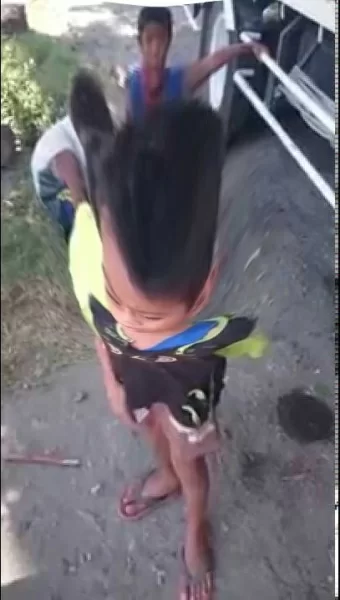 By the grace of God, for instance, I have enough to eat, a good place to live, money for my diabetes medications and meaningful work that provides many emotional, material and spiritual blessings. But just 0utside my office are children who go to sleep hungry, who wake up with nobody to say "good morning," and with only bleak prospects for having their basic needs met. This noon I drove to McDonalds for a late lunch and was heading back to the office to eat. At the stoplight a little boy approached my car, tapped on my window and held out a deformed hand to ask for money. He motioned to his stomach to indicate that he was hungry. In his eyes was a hunger that went beyond his need for something to eat to indicate a hopelessness at life in general. But he doesn't have the luxury of looking at his life reflectively. He was hungry, and was looking at the food that I had purchased at the drive through that was on the seat next to me, food that I could easily do without. I gave him a handful of fries and drove off. On other occasions I might have just shook my head and not given him anything. Nutritionists might say that he was better off with nothing than a greasy fry, I don't know. But as I drove away my mind came up with many questions that I have considered often in my 38 years in Cebu, questions that don't really have answers but weigh heavily on my heart on occasions such as this.
By the grace of God, for instance, I have enough to eat, a good place to live, money for my diabetes medications and meaningful work that provides many emotional, material and spiritual blessings. But just 0utside my office are children who go to sleep hungry, who wake up with nobody to say "good morning," and with only bleak prospects for having their basic needs met. This noon I drove to McDonalds for a late lunch and was heading back to the office to eat. At the stoplight a little boy approached my car, tapped on my window and held out a deformed hand to ask for money. He motioned to his stomach to indicate that he was hungry. In his eyes was a hunger that went beyond his need for something to eat to indicate a hopelessness at life in general. But he doesn't have the luxury of looking at his life reflectively. He was hungry, and was looking at the food that I had purchased at the drive through that was on the seat next to me, food that I could easily do without. I gave him a handful of fries and drove off. On other occasions I might have just shook my head and not given him anything. Nutritionists might say that he was better off with nothing than a greasy fry, I don't know. But as I drove away my mind came up with many questions that I have considered often in my 38 years in Cebu, questions that don't really have answers but weigh heavily on my heart on occasions such as this.
- Why does this little guy have nothing and I have everything? Is there a single thing about how I have lived my life that qualifies me for advantage? Has this little guy done anything wrong to deserve a withered arm and a hungry tummy?
- Why didn't I just give him my whole lunch instead of a few paltry fries? By suppertime I would be dining on a good meal and he would be hungry again. Likely, I just wanted him to go away from my car.
- What does he think about me and what I represent?
- If he ever does look to the future, does he have a shred of hope that things will get better for him? With little or no positive family or other adult influence, with no access to health care or decent education, and with daily exposure to the many dangers from living on the street, is there any chance whatsoever that he will? What will be different for him, his eventual children and theirs?
- What is life like without hope? Can I even begin to understand that?
The disparities of life in a country like the Philippines are hard to grasp. Living here provides graphic proof that God's grace has nothing to do with merit. Not a thing. That kid deserves a break much more than I ever do or will. All I can do, perhaps, is to think about why God called me to live much of my life here and not in the country of my birth. Some people think that, in choosing to live here, I forsook the luxuries of life for the difficulties of the third world. But I live in the lap of luxury here, too. I just have to pay an emotional price for doing so as I come face to face with people who struggle just to stay alive.
I've been dealing with these same questions for 38 years! At CSC we have been able to help lots of little guys like the one I saw today. We have taken in the hungry, the lame, the disfigured, the homeless. We have dispensed food, medicine, knowledge, even hope. But we aren't helping this little guy at all. Except for a fistfull of fries. Of course we can't help everyone, I know that. But that knowledge doesn't remove his image from my mind or, on the other hand, make his life one ounce better.
I pray for wisdom, to accept the things that I cannot change, to be an agent of positive change where I can, and to know the difference, even though knowing that difference does not provide emotional relief from the confrontations with hopelessness that are a part of life in a place like this. I guess the best way to accomplish the dictates of the above-cited Serenity Prayer is to focus on the things that I can change, not on what I cannot. On the tree, not the forest. But I'm very sure that there are things that I can change if I open my mind to them, to see people not as an inconvenience but an opportunity. Maybe I can use some of the incomprehensible advantages that have been bestowed on me to offer some measure of relief and, maybe, even hope to people like the little boy who I cannot get out of my head.
Fathers
The dust has settled on Father's Day here in Cebu. For me it was kind of an 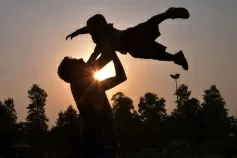 emotional day. I lost my dad a year ago on Father's Day, and it was with a mixture of sadness and thankfulness that I reflected on Jer. I was given lots of cards and hugs from CSC kids, which helped. And my daughers greeted me, which was great. I have always been thankful to them for "sharing" their dad with so many other kids over the years.
emotional day. I lost my dad a year ago on Father's Day, and it was with a mixture of sadness and thankfulness that I reflected on Jer. I was given lots of cards and hugs from CSC kids, which helped. And my daughers greeted me, which was great. I have always been thankful to them for "sharing" their dad with so many other kids over the years.
Father's Day can be a little complicated for the kids at CSC. Many of them have birth father's who were absent, abusive or neglectful. The reason that many of them had to come to CSC was because of their birth fathers. They preferred the company of their buddies to their children. They squandered money on gambling or alcohol while their kids suffered with sickness or hunger. They found other women, abandoning their families. They took out their anger and frustrations on their kids.
Coming to live at CSC meant that children had a second chance at family and that started with house parents who love them and see that their needs are met. So, children who suffered with difficult birth fathers are now benefiting from house fathers who are helping them understand what a Christian home is all about and the meaning of fatherly love. Nobody is ignoring them. Nobody is abusing them. Nobody is making them feel worthless. Instead they are valued, disciplined with fairness and love, and taught about a Heavenly Father who loves them unconditionally and deeply. It was fun to see the CSC kids honor their house fathers on Father's Day!
Some of our kids are soon to be leaving for adoption, where they will have new fathers and mothers. Right now we have 11 children who have been matched and accepted and who are awaiting the completion of their visas so they can join their new families. New relationships await them, and one of the most significant will be having a new father to love them in ways that are different than anything they have previously experienced. We hope and pray that the love of their house fathers at CSC has prepared them to accept and return the love that their adoptive fathers will give.
So, many of our CSC kids will have four fathers in their lives: a birth father who gave them life; a CSC house father who was a part of their healing and preparation; an adoptive father who provides permanence and a special kind of love, and a Heavenly Father who will love them eternally.





